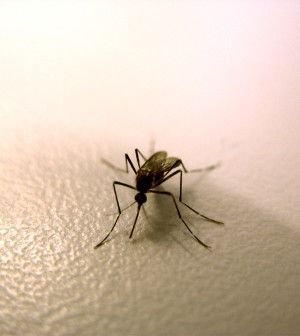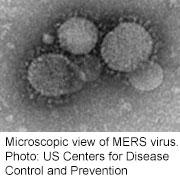- 10 Strategies to Overcome Insomnia
- Could Artificial Sweeteners Be Aging the Brain Faster?
- Techniques for Soothing Your Nervous System
- Does the Water in Your House Smell Funny? Here’s Why
- Can a Daily Dose of Apple Cider Vinegar Actually Aid Weight Loss?
- 6 Health Beverages That Can Actually Spike Your Blood Sugar
- Treatment Options for Social Anxiety Disorder
- Understanding the Connection Between Anxiety and Depression
- How Daily Prunes Can Influence Cholesterol and Inflammation
- When to Take B12 for Better Absorption and Energy
Synthetic MERS Vaccine Works in Animal Tests


An experimental vaccine protected monkeys against the Middle East Respiratory Syndrome (MERS) virus, U.S. researchers report.
University of Pennsylvania researchers gave the synthetic DNA vaccine to rhesus macaques six weeks before exposing them to the MERS virus, and found that all of them were fully protected.
The vaccine also generated potentially protective antibodies in blood from camels, believed to be the source of MERS transmission in the Middle East.
The study was published Aug. 19 in the journal Science Translational Medicine.
Since it was identified in 2012, the coronavirus has caused more than 1,300 infections and nearly 400 deaths in the Middle East, Europe, South Korea and the United States, the researchers said.
“The significant recent increase in MERS cases, coupled with the lack of effective antiviral therapies or vaccines to treat or prevent this infection, have raised significant concern,” study author David Weiner, a professor of pathology and laboratory medicine at the university’s Perelman School of Medicine, said in a university news release.
“Accordingly, the development of a vaccine for MERS remains a high priority,” he added.
The experimental vaccine is non-live and poses no risk of unintended spread of the virus, study first author Karuppiah Muthumani said in the news release.
Muthumani, a research assistant professor of pathology and laboratory medicine at the Philadelphia-based university, said the vaccine could potentially overcome important production and delivery issues.
More information
The U.S. Centers for Disease Control and Prevention has more about MERS.
Source: HealthDay
Copyright © 2026 HealthDay. All rights reserved.










